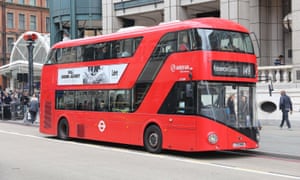Insolvency expected after failure of last-minute buyout talks

Wrightbus manufactured London’s New Routemaster buses.
Photograph: Marek Slusarczyk/Alamy Stock Photo
Wrightbus, one of Northern Ireland’s largest employers with 1,400 staff, is expected to slump into administration tomorrow after failing to securing an eleventh-hour rescue deal.
The move will represent the UK’s second largest insolvency of the week, following the liquidation of the holiday group, Thomas Cook.
The Ballymena-based engineering company, which manufactured the New Routemaster buses launched by then mayor of London Boris Johnson in 2012, had been scrambling to find a buyer.
At the end of last week, an expected sale evaporated when the Chinese engineering group Weichai and a firm led by the JCB heir, Jo Bamford, pulled out of talks. That double blow came just days after Northern Irish businessman Darren Donnelly also withdrew from making a potential bid for the firm.
The accounting group Deloitte, which had been running the sales auction for the company, is understood to have been lined up as an administrator. Sources close to Wrights Group, the company behind Wrightbus, indicated that an announcement concerning its administration would likely be made on Wednesday morning.
Wrightbus, which was founded in 1946 as Robert Wright & Son Coachbuilders and began life working on lorries, has been struggling with its finances for months and made two rounds of redundancies last year with 95 jobs going in February and June.
It had some recent successes in selling its products, including a Transport for London (TfL) order for 20 brand new hydrogen-powered buses, which cost around £500,000 each and only emit water as exhaust in May.
However, Johnson’s successor as mayor, Sadiq Khan, cancelled further purchases of the New Routemasters in 2016 and the company’s finances came increasingly under pressure as the UK bus market slowed.
Bus operators had ordered a large number of vehicles in recent years to meet new emissions standards, but have now taken a cautious approach to new orders.
Profile
Northern Ireland manufacturing

The collapse of Harland and Wolff is just the latest blow to manufacturing in Northern Ireland, under pressure from firms offering cheaper labour costs abroad and weak economic environment.
Multiple factories have closed there in recent years, with fears of more to come if the UK leaves the EU without a deal.
The manufacturing sector is disproportionately large in Northern Ireland compared with the rest of the UK. A study from Oxford Economics found it accounts for about a third of the economy, compared to only a tenth of the overall UK output.
The same study suggests that the sector supports 214,000 jobs directly and indirectly, or a quarter of all employment.
Much of Northern Ireland’s manufacturing – from linen to shipbuilding – has fallen prey to the same forces of globalisation faced by the rest of the UK. Added to that is the new threat of a no-deal Brexit.
The government’s own forecasts suggest a no-deal Brexit could lead to a sharp rise in unemployment, with at least 40,000 jobs at risk, based on EU export exposure. Many of those jobs will be focused in manufacturing, heavily reliant on frictionless exports across the Irish border.
- Bombardier – the Canadian aerospace firm is looking to offload its Northern Irish business, the historic Short Brothers operation which employ 3,600 people. Mitsubishi Heavy Industries bought a smaller part of the business in June.
- Wrightbus – The maker of the new London Routemaster bus, ordered by Boris Johnson when he was mayor, is looking for a rescuer. Around 1,400 jobs, mainly in Ballymena, Co Antrim, are at stake.
- Michelin – the French tyremaker closed its factory in Ballymena last year, with the loss of 860 jobs. It blamed a downturn in demand from European lorries since the financial crisis.
- JTI Gallaher – The cigarette factory was another major Ballymena victim, closing its factory in 2014. The Japanese owners blamed falling demand for cigarettes in Europe, hitting the maker of the Silk Cut and Benson and Hedges brands.
In its last set of accounts, for the 12 months to December 2017, Wrights Group made sales of £227m and a profit of £1.5m – figures down from £264m and £10.7m from the year before. The financial position of the company is thought to have deteriorated significantly since the last financial update.
Before the potential bidders pulled out of talks last week, the company had raised staff hopes that a deal was imminent. On Thursday, Wrightbus management told employees it was “now in a race to complete a final deal with credible bidders”.
It added: “This ongoing business and its employees are our number one priority and we are confident that a positive outcome can be delivered over the next few days.”
On Tuesday, Wrights Group said it did not have anybody available to comment. Deloitte declined to comment too.